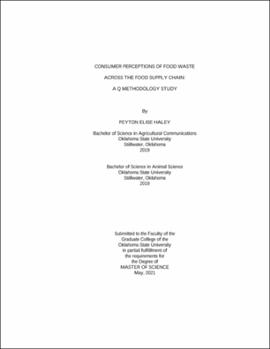| dc.contributor.advisor | Riggs, Angel | |
| dc.contributor.author | Haley, Peyton Elise | |
| dc.date.accessioned | 2021-09-24T13:57:59Z | |
| dc.date.available | 2021-09-24T13:57:59Z | |
| dc.date.issued | 2021-05 | |
| dc.identifier.uri | https://hdl.handle.net/11244/330913 | |
| dc.description.abstract | In the United States, approximately 40% of all food produced is never eaten ("Food Waste FAQs," n.d.). The issue of food waste has gained attention in the United States over the last decade (Collart & Interis, 2018; Neff et al., 2015). Much research exists regarding consumer beliefs about food waste in the latter half of the food supply chain - the retail and consumer sectors - but there is a gap in literature regarding consumer beliefs regarding the production, processing, and distribution sectors (Conrad & Blackstone, 2020; Roodhuyzen et al., 2017). | |
| dc.description.abstract | Previous studies have provided a broad overview of consumer beliefs, attitudes, and motivations relative to food waste, but the nuances of those perspectives have yet to be identified, making Q methodology an ideal choice for this study. The 36-statement Q set described ideas about food waste across the food supply chain and were developed through a hybrid approach, drawing from both naturalistic and theoretical sources. Twenty consumers completed Q sorts, directed by the condition of instruction: "What are your thoughts about food waste?" | |
| dc.description.abstract | The sorts were entered into the PQMethod software program. Principal components analysis and varimax rotation resulted in a three-factor solution. Data analysis, post-sort interviews, demographic questioning, and factor arrays were used to interpret the resulting factors. The factors were named the Reformers, the Individualists, and the Helpers. | |
| dc.description.abstract | The Reformers perspective operates in big picture ideals. They can see change and believe it is within their grasp. They believe their actions make a true difference and want other sectors of the food supply chain to feel that way as well. Individualists are not that concerned about food waste. They don't see it affecting their lives and therefore don't have much desire to act. They believe actions have consequences and that every sector is responsible for their own. Helpers worry about how food waste affects them, and the people they know, on a personal level. They sympathize with producers and are cautious when it comes to what they allow themselves to waste. | |
| dc.format | application/pdf | |
| dc.language | en_US | |
| dc.rights | Copyright is held by the author who has granted the Oklahoma State University Library the non-exclusive right to share this material in its institutional repository. Contact Digital Library Services at lib-dls@okstate.edu or 405-744-9161 for the permission policy on the use, reproduction or distribution of this material. | |
| dc.title | Consumer perceptions of food waste across the food supply chain: A Q methodology study | |
| dc.contributor.committeeMember | Blackwell, Samantha | |
| dc.contributor.committeeMember | Settle, Quisto | |
| osu.filename | Haley_okstate_0664M_17131.pdf | |
| osu.accesstype | Open Access | |
| dc.type.genre | Thesis | |
| dc.type.material | Text | |
| dc.subject.keywords | consumer perceptions | |
| dc.subject.keywords | food waste | |
| dc.subject.keywords | q methodology | |
| thesis.degree.discipline | Agricultural Communications | |
| thesis.degree.grantor | Oklahoma State University | |
